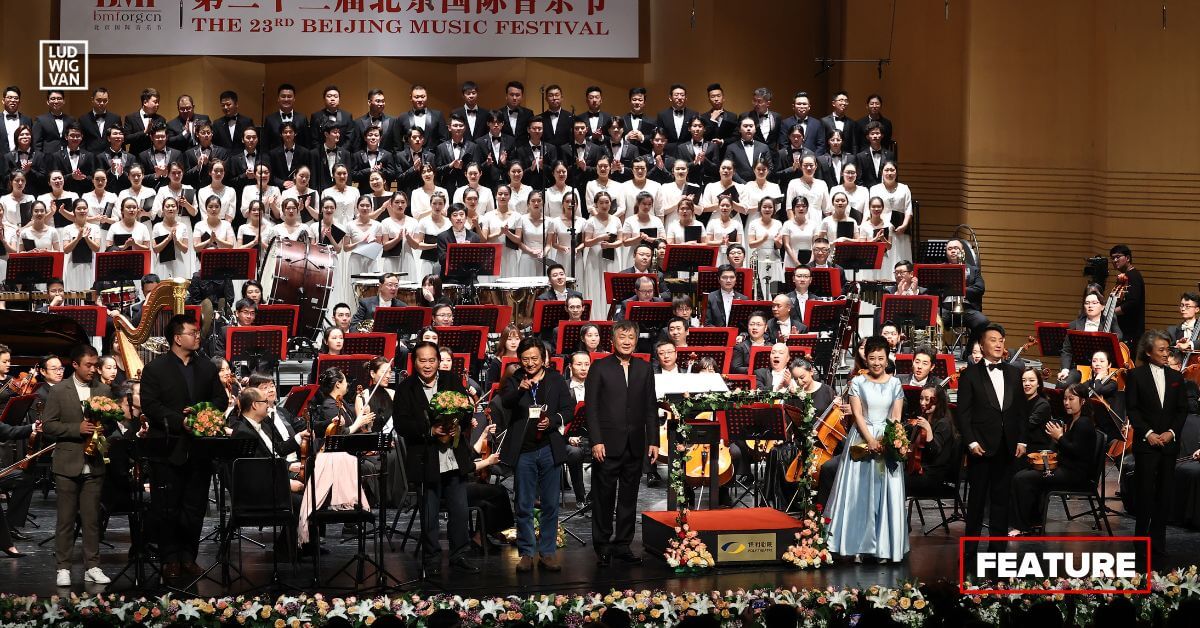
In partnership with The Beijing Music Festival
After a year off due to COVID, the Beijing Music Festival is looking forward to a fresh start, and the themes for 2023 are Music, Youth, Future, and Attitude. The festival will include 25 performances over 24 days from September 22 to October 15, 2023.
Organized by the Ministry of Culture and Tourism of the People’s Republic of China and the Beijing Municipal Government, the festival was initiated in 1998 by conductor Long Yu. He continues to serve as Chairman of the Artistic Committee.
Celebrating its 25th year, after a pandemic-induced postponement, the festival remains a vital cultural touchstone.
A Festival Of Firsts
“Since its foundation by maestro Long Yu over a quarter-century ago, the festival has consistently been a cultural landmark,” says current Artistic Director Shuang Zou.
Over its tenure, BMF has hosted luminaries like Daniel Barenboim, Sir Simon Rattle, Yo-Yo Ma, and many more. Internationally renowned ensembles such as the Berlin Philharmonic, New York Philharmonic, and Orchestre de Paris, to name a few, have graced its stages.
Despite classical music’s relatively recent emergence in China compared to its deep-rooted history in the West, the BMF has showcased pivotal moments, including:
- Chinese premiere of Mahler’s “Symphony of a Thousand”.
- Asian debut of Berg’s Lulu in 2002.
- Beijing introductions of Shostakovich’s Lady Macbeth of Mtsensk and The Nose.
In 2010, the BMF also commissioned Canadian composer Howard Shore’s piece, “Ruin and Memory”, marking Chopin’s bicentennial. This piece debuted with a performance by Lang Lang.
Furthermore, the BMF has premiered works by Krzysztof Penderecki, Philip Glass, Guo Wenjing, Ye Xiaogang, Tan Dun, and Unsuk Chin, among others.
Each year, the Beijing Music Festival collaborates with the Education Department of the Central Conservatory of Music to present free children’s and student concerts and host ten master class cycles.
The Evolution of the Beijing Music Festival
“I believe the festival has undergone several transformations,” says Zou. She cites its inception in 1997/98 until the millennium as a foundational period, followed by growth until the 2008 Beijing Olympics and a continued rise in recognition thereafter.
COVID dramatically altered its trajectory. “Our perspective shifted,” she notes.
Joining in 2006, Zou sensed a generational shift in the city’s musical appetite. The festival began evolving, departing from traditional concert hall norms, delving into crossover genres, and introducing the Urban Series in unconventional venues. There was a concentrated effort to diversify audience demographics.
“We aimed to broaden not just the music but the audience’s background,” she explains.
Zou mentions how site-specific operas, new commissions, and a balanced blend of Chinese and Western composers contributed to an influx of fresh ideas. “Many innovative concepts were on the brink of realization,” she reflects, before the pandemic disrupted plans.
In 2020, the festival went virtual, culminating in 240 continuous hours of online content, ranging from performances to podcasts. Their motto was poignant: Music never stops.
Reflecting on that year, Zou remembers, “Everyone was grounded.” The virtual format was well-received.
In 2021, the festival resumed with public performances, though international musicians were absent. However, this situation attracted many Chinese music students worldwide, who returned to participate and attend.
Their experiences and learning are ingrained in this year’s festival, encapsulated in the slogan: Music, Youth, Future, and Attitude.
“It’s a different kind of reunion this year,” Zou muses, emphasizing a renewed, youthful spirit. The festival aims to juxtapose the vibrant underground classical scene with the grandeur of concert halls.
One notable inclusion is jazz/classical crossover artist Laufey. Her sold-out China debut was amplified by a strong social media influence and over 10 million Spotify streams. Yet, Zou assures that traditional classical music enthusiasts have much to anticipate.
Festival Highlights
The festival showcases an array of talent, from the Shanghai Quartet, celebrating their 40th anniversary, to British virtuoso Stephen Hough’s solo piano recital.
Significant highlights include:
- The opening night titled “Commemorating Liu Tianhua and the 101st Anniversary of the Founding of the Peking University Music Training Institute.”
- A collaboration with Dahua City Center for the Performing Arts to present Haydn’s opera Il Mondo della Luna.
- The Monkey King by Liu Sola combines traditional Chinese elements with contemporary sounds.
- The Chinese premiere of Hao Weiya’s semi-staged opera AI’s Variation.
On the final night, conductors John Warner and Kim Yook will guide the Beijing Music Festival Orchestra in Dvořák’s Symphony No. 9, From the New World.
Collaborations
The festival champions dialogue between China and the West. This year’s collaborations include:
- Violist Mei Diyang with the Berliner Barock Solisten.
- Violinist Lin Ruifeng as a special guest with the London Sinfonietta.
- Jazz artist Laufey with the China Philharmonic Orchestra.
Celebrating Mahler
The resident Mahler Foundation Festival Orchestra, comprising young musicians from various European nations, will engage in a dialogue with Mahler’s works under the guidance of British conductor John Warner.
Zou highlights the synergy between Mahler’s themes and the selected young Chinese and Western composers. In the concluding segment, Mahler’s compositions will be performed in their authentic form.
Lastly, the Music in Parks series will host local and international chamber musicians at the Divine Music Administration of Temple of Heaven for afternoon tea concerts.
More information on their website [HERE].
#LUDWIGVAN
Get the daily arts news straight to your inbox.